 W
WAlif the Unseen is a 2012 cyberpunk fantasy novel by American writer G. Willow Wilson. In the novel, a Middle Eastern hacker named Alif discovers a book of djinn tales which may lead to a new age of quantum computing. The novel won the 2013 World Fantasy Award for Best Novel.
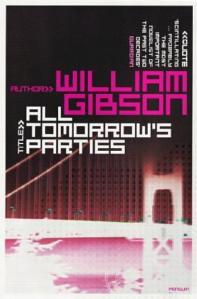 W
WAll Tomorrow's Parties is a science fiction novel by American-Canadian writer William Gibson, the third and final book in his Bridge trilogy. Like its predecessors, All Tomorrow's Parties is a speculative fiction novel set in a postmodern, dystopian, postcyberpunk future. The novel borrows its title from a song by Velvet Underground. It is written in the third person and deals with Gibsonian themes of emergent technology. The novel was initially published by Viking Press on October 7, 1999.
 W
WAltered Carbon is a 2002 cyberpunk novel by British writer Richard K. Morgan. Set in a future in which interstellar travel is facilitated by transferring consciousnesses between bodies ("sleeves"), it follows the attempt of Takeshi Kovacs, a former U.N. elite soldier turned private investigator, to investigate a rich man's death. It is followed by the sequels Broken Angels and Woken Furies.
 W
WAmbient is the dystopian debut novel of cyberpunk writer Jack Womack, the first in his Dryco series. Published in 1987, it was translated into Slovak by Michal Hvorecký, and has a significant cult following. Actor Bruce Willis optioned the novel, and renewed the option in 1995.
 W
WAngel Station is a 1990 cyberpunk space opera science fiction novel by Walter Jon Williams.
 W
WBabylon Babies is the third novel by French-born naturalized Canadian writer Maurice G. Dantec, published in 1999. It follows La Sirène rouge (1993) and Les Racines du mal (1995).
 W
WBreakpoint is a cyberpunk science fiction novel by former United States intelligence and counterterrorism official Richard A. Clarke. It is his second novel. The book paints a dystopic prediction of the future.
 W
WCount Zero is a science fiction novel by American-Canadian writer William Gibson, originally published in 1986. It is the second volume of the Sprawl trilogy, which begins with Neuromancer and concludes with Mona Lisa Overdrive, and is an example of the cyberpunk subgenre.
 W
W"Cyberpunk" is a science fiction short story and novel written by Bruce Bethke in 1980, published November 1983 in Amazing Stories magazine, and published in novel form online. It is most famous for coining the word "cyberpunk", which came to be used to describe the media subgenre centered on rebellious use of technology under the science fiction archetype.
 W
WThe Diamond Age: Or, A Young Lady's Illustrated Primer is a science fiction novel by American writer Neal Stephenson. It is to some extent a Bildungsroman or coming-of-age story, focused on a young girl named Nell, set in a future world in which nanotechnology affects all aspects of life. The novel deals with themes of education, social class, ethnicity, and the nature of artificial intelligence. The Diamond Age was first published in 1995 by Bantam Books, as a Bantam Spectra hardcover edition. In 1996, it won both the Hugo and Locus Awards, and was shortlisted for the Nebula and other awards. In 2009, a six-hour miniseries adapted from the novel was slated for development for the Syfy Channel, although the adaptation did not ultimately emerge.
 W
WDr. Adder is a dark science fiction novel by American writer K. W. Jeter, set in a future where the United States has largely broken down into reluctantly cooperating enclaves run by a wide variety of strongmen and warlords, with a veneer of government control that seems largely interested in controlling technology. Dr. Adder is an artist-surgeon, who modifies sexual organs of his patients to satisfy the weirdest of perversion; he is clearly depicted as a partly criminal, partly counter-cultural figure in a future Los Angeles which anticipates the cyberpunk idea of the Sprawl trilogy.
 W
WDreaming Metal is a 1997 science fiction novel by American writer Melissa Scott, which explores the question of when does artificial intelligence become indistinguishable from human intelligence. Another theme of the book is the impact of terrorism on the lives of people and how artists react to this. The book is an example of the cyberpunk genre.
 W
WThe Exile Kiss is a cyberpunk science fiction novel by American writer George Alec Effinger, published in 1991. It is the third novel in the three-book Marîd Audran series, following the events of A Fire in the Sun. The title of the novel comes from Coriolanus, by William Shakespeare: "O! a kiss / Long as my exile, sweet as my revenge!".
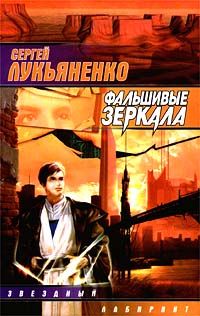 W
WFalse Mirrors is the second novel in the Labyrinth trilogy of cyberpunk novels written by Russian science fiction writer Sergey Lukyanenko. The novel takes place two years after Labyrinth of Reflections and describes the life of a former diver after the diver profession becomes obsolete. Deeptown, the virtual city created by Microsoft and IBM moves on and grows to accommodate an ever-changing world. The semi-peaceful life of the inhabitants of Deeptown is shaken when a hacker is killed by a virtual weapon.
 W
WFeed (2002) is a young adult dystopian novel of the cyberpunk subgenre written by M. T. Anderson. The novel focuses on issues such as corporate power, consumerism, information technology, data mining, and environmental decay, with a sometimes sardonic, sometimes somber tone. From the first-person perspective of a teenager, the book takes place in a near-futuristic American culture completely dominated by advertising and corporate exploitation, corresponding to the enormous popularity of internetworking brain implants.
 W
WA Fire in the Sun is a cyberpunk science fiction novel by American writer George Alec Effinger, published in 1989. It is the second novel in the three-book Marîd Audran series, following the events of When Gravity Fails, and concentrating on Marîd's experience as he becomes the main lieutenant of Friedlander Bey's business empire while realising that his new master has darker aspects than he suspected.
 W
WThe Fortunate Fall is the debut and only novel by Raphael Carter, published by Tor Books in 1996. The title comes from the Christian theological concept of felix culpa.
 W
WHardwired is a 1986 cyberpunk science fiction novel by American writer Walter Jon Williams.
 W
WHeadcrash is a satirical cyberpunk novel by Bruce Bethke, published in 1995 by Warner Books. It won the Philip K. Dick Award in 1995.
 W
WHot Head is a 1992 science fiction novel by English author Simon Ings. Part cyberpunk, part neo-noir, Ings attracted positive reviews from sci-fi enthusiasts for what was his debut novel.
 W
WIdoru is the second book in William Gibson's Bridge trilogy. Idoru is a science-fiction novel set in a postmodern, dystopian, cyberpunk future. One of the main characters, Colin Laney, has a talent for identifying nodal points, analogous to Gibson's own:Laney’s node-spotter function is some sort of metaphor for whatever it is that I actually do. There are bits of the literal future right here, right now, if you know how to look for them. Although I can’t tell you how; it’s a non-rational process.
 W
WIslands in the Net is a 1988 science fiction novel by American writer Bruce Sterling. It won the John W. Campbell Memorial Award for Best Science Fiction Novel in 1989, and was nominated for both the Hugo and Locus Awards that same year.
 W
WLabyrinth of Reflections is the first novel in the Labyrinth trilogy of cyberpunk novels by Russian science fiction author Sergey Lukyanenko. The trilogy consists of Labyrinth of Reflections, False Mirrors, and Transparent Stained-Glass Windows. Between the second and third books, Sergey Lukyanenko authorized the release of a compilation of stories by other authors set in the same world as the trilogy.
 W
WLittle Heroes is a 1987 science fiction novel by American author Norman Spinrad.
 W
WMindplayers is a 1987 first novel by science fiction author Pat Cadigan.
 W
WMona Lisa Overdrive is a science fiction novel by American-Canadian writer William Gibson, published in 1988. It is the final novel of the cyberpunk Sprawl trilogy, following Neuromancer and Count Zero, taking place eight years after the events of the latter. The novel was nominated for the Nebula Award for Best Novel, the Hugo Award for Best Novel, and the Locus Award for Best Science Fiction Novel in 1989.
 W
WMoxyland is a cyberpunk dystopian novel written by South African author, Lauren Beukes. The book was published in 2008.
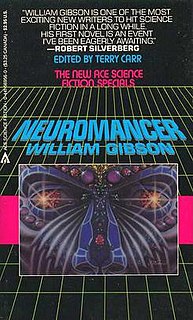 W
WNeuromancer is a 1984 science fiction novel by American-Canadian writer William Gibson. It is one of the best-known works in the cyberpunk genre and the first novel to win the Nebula Award, the Philip K. Dick Award, and the Hugo Award. It was Gibson's debut novel and the beginning of the Sprawl trilogy. Set in the future, the novel follows Henry Case, a washed-up computer hacker who is hired for one last job, which brings him up against a powerful artificial intelligence.
 W
WNight Sky Mine is a 1996 science fiction novel by Melissa Scott set in a future after computer programs have run amok. After the Crash, an interface has been created that portrays programs as various floral, faunal and mythological species, depending on the characteristics of the program. Scott explores this interface between human society and cyberspace, both as a plot device and as back drop for the story.
 W
WNinja Slayer is a novel series created by American authors Bradley Bond and Philip "Ninj@" Morzez. After they gave permission for Japanese translations to be published via Twitter, Enterbrain published the first translated novel in September 2012, with illustrations by Warainaku. Sixteen novels have been released as of June 2016. It has received three manga adaptations. An ONA adaptation produced by Trigger and directed by Akira Amemiya which aired from April to October 2015.
 W
WNinth Step Station is a cyberpunk buddy cop crime drama series published by Serial Box. Like all Serial Box productions, it may be consumed as an audio drama or an ebook. Its authors include Malka Older, Fran Wilde, Jacqueline Koyanagi, and Curtis C. Chen. The plot focuses on an American lieutenant who is sent to work with the Tokyo Police Force after a war divides Tokyo between Chinese and American control. Emma Higashi works with Miyako Koreda to solve crimes throughout the city. The first season was released in March 2019, and the production has been renewed for a second season.
 W
WPollen is a 1995 science fiction novel written by British author Jeff Noon.
 W
WPolymorph is a 1997 cyberpunk novel by American science fiction author Scott Westerfeld.
 W
WReady Player One is a 2011 science fiction novel, and the debut novel of American author Ernest Cline. The story, set in a dystopia in 2045, follows protagonist Wade Watts on his search for an Easter egg in a worldwide virtual reality game, the discovery of which would lead him to inherit the game creator's fortune. Cline sold the rights to publish the novel in June 2010, in a bidding war to the Crown Publishing Group. The book was published on August 16, 2011. An audiobook was released the same day; it was narrated by Wil Wheaton, who was mentioned briefly in one of the chapters. In 2012, the book received an Alex Award from the Young Adult Library Services Association division of the American Library Association and won the 2011 Prometheus Award. A film adaptation, screenwritten by Cline and Zak Penn and directed by Steven Spielberg, was released on March 29, 2018. A sequel, Ready Player Two, was released on November 24, 2020.
 W
WReady Player Two is a science fiction novel by American author Ernest Cline released in 2020. It is the sequel to his 2011 debut novel Ready Player One. Plans for a Ready Player One sequel were first announced back in 2015, though Cline did not begin writing the book until late-2017. Cline attributes further developments to the critical and financial success of the film adaptation of the first novel. Ready Player Two was published and released on November 24, 2020. It debuted at number one on The New York Times Best Seller list.
 W
WRise of the Robots is a fighting game released by Time Warner Interactive in 1994. Originally developed for the Amiga and PC DOS computers by Mirage's Instinct Design, it was ported to various video game consoles, including the Super NES, the Mega Drive, and the 3DO Interactive Multiplayer. The game includes a single-player mode in which the player assumes the role of the ECO32-2 Cyborg, as he attempts to stop the Supervisor who takes over Electrocorp's facilities in Metropolis 4.
 W
WSchismatrix is a science fiction novel by Bruce Sterling, originally published in 1985. The story was Sterling's only novel-length treatment of the Shaper/Mechanist universe. Five short stories preceded the novel and are published together with it in a 1996 edition entitled Schismatrix Plus. Schismatrix was nominated for the Nebula Award for Best Novel in 1985, and the British Science Fiction Award in 1986.
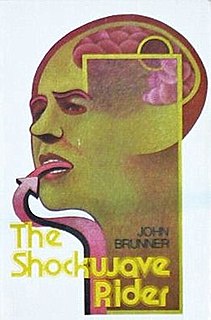 W
WThe Shockwave Rider is a science fiction novel by John Brunner, originally published in 1975. It is notable for its hero's use of computer hacking skills to escape pursuit in a dystopian future, and for the coining of the word "worm" to describe a program that propagates itself through a computer network. It also introduces the concept of a Delphi pool, perhaps derived from the RAND Corporation's Delphi method – a futures market on world events which bears close resemblance to DARPA's controversial and cancelled Policy Analysis Market.
 W
WSnow Crash is a science fiction novel by American writer Neal Stephenson, published in 1992. Like many of Stephenson's novels, it covers history, linguistics, anthropology, archaeology, religion, computer science, politics, cryptography, memetics and philosophy.
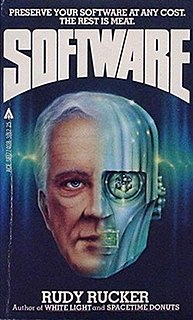 W
WSoftware is a 1982 cyberpunk science fiction novel written by Rudy Rucker. It won the first Philip K. Dick Award in 1983. The novel is the first book in Rucker's Ware Tetralogy, and was followed by a sequel, Wetware, in 1988.
 W
WTea from an Empty Cup is a 1998 cyberpunk novel by American writer Pat Cadigan.
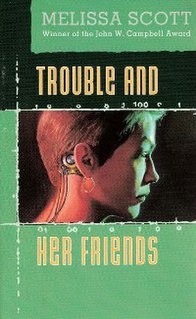 W
WTrouble and Her Friends is a science fiction novel by American writer Melissa Scott, first published in 1994. It is set in the United States of America sometime in the near future, and tells the story of India Carless, who goes by the name "Trouble" in her life as a criminal hacker, and her ex-lover Cerise. After leaving the underground behind three years earlier, they discover someone impersonating Trouble online, and reunite to travel across the country to confront him. In its extensive use of virtual reality and neural implants, the novel is a solid example of cyberpunk; however, it is unusual for that genre for having, like much of Scott's work, a distinct feminist perspective and main characters who are gay or lesbian.
 W
WTrue Names is a 1981 science fiction novella by American writer Vernor Vinge, a seminal work of the cyberpunk genre. It is one of the earliest stories to present a fully fleshed-out concept of cyberspace, which would later be central to cyberpunk. The story also contains elements of transhumanism, anarchism, and even hints about The Singularity.
 W
WVacuum Flowers is a science fiction novel by American writer Michael Swanwick, published in 1987. It is an early example of the cyberpunk genre, and features one of the earliest uses of the concept wetware.
 W
WVirtual Light is a science fiction novel by American-Canadian writer William Gibson, the first book in his Bridge trilogy. Virtual Light is a science-fiction novel set in a postmodern, dystopian, cyberpunk future. The term 'Virtual Light' was coined by scientist Stephen Beck to describe a form of instrumentation that produces optical sensations directly in the eye without the use of photons. The novel was a finalist nominee for a Hugo Award, and shortlisted for the Locus Award in 1994.
 W
WVoice of the Whirlwind is a 1987 cyberpunk science fiction novel by American writer Walter Jon Williams.
 W
WVurt is a 1993 science fiction novel written by British author Jeff Noon. The debut novel for both Noon and small publishing house Ringpull, it went on to win the 1994 Arthur C. Clarke Award and was later listed in The Best Novels of the Nineties.
 W
WThe Ware Tetralogy is a series of four science fiction novels by author Rudy Rucker: Software (1982), Wetware (1988), Freeware (1997) and Realware (2000).
 W
WWetware is a 1988 biopunk science fiction novel written by Rudy Rucker. It shared the Philip K. Dick Award in 1988 with Four Hundred Billion Stars by Paul J. McAuley. The novel is the second book in Rucker's Ware Tetralogy, preceded by Software in 1982 and followed by Freeware in 1997.
 W
WWhen Gravity Fails is a cyberpunk science fiction novel by American writer George Alec Effinger, published in 1986. It was nominated for the for Nebula Award for Best Novel in 1987 and the Hugo Award for Best Novel in 1988. The title is taken from "Just Like Tom Thumb's Blues", a song by Bob Dylan: "When your gravity fails and negativity don't pull you through".